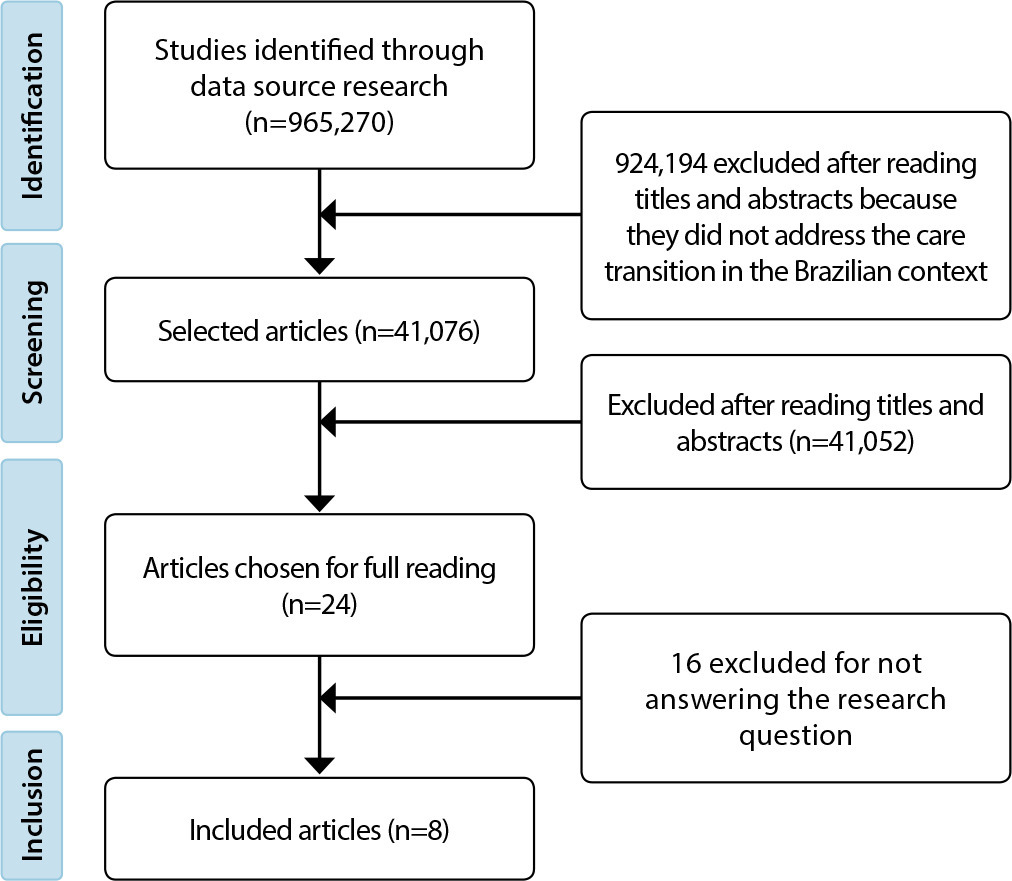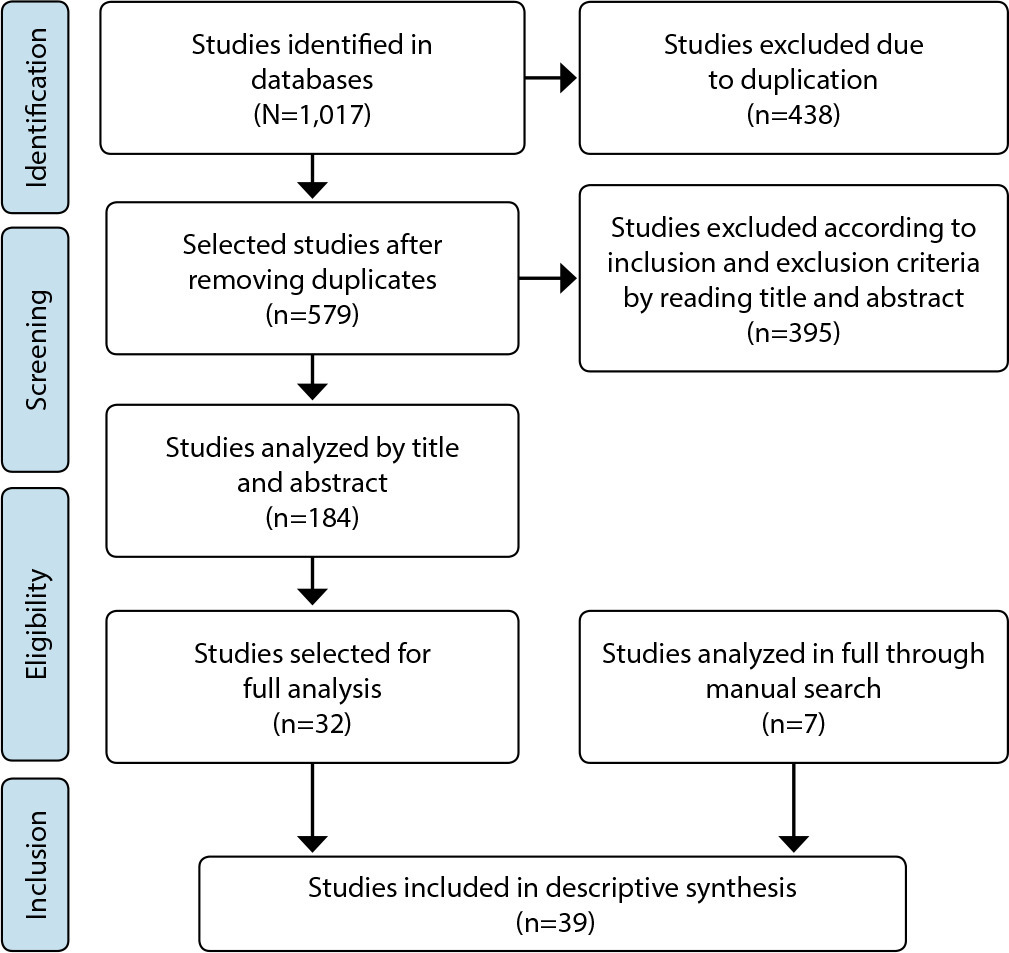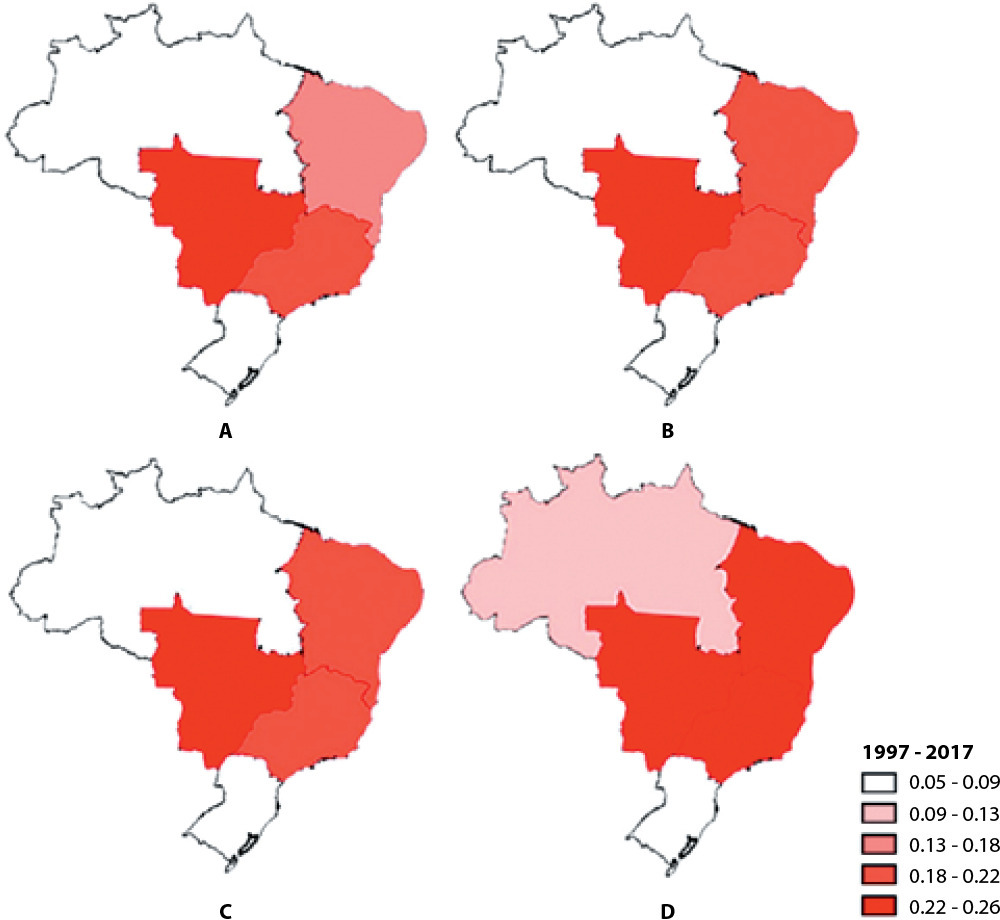-
REVIEW
Transition of Care for Individuals with Mental Disorders in Brazil: A Contextual Analysis
Revista Brasileira de Enfermagem. 2023;76(6):e20230063
12-04-2023
Resumo
REVIEWTransition of Care for Individuals with Mental Disorders in Brazil: A Contextual Analysis
Revista Brasileira de Enfermagem. 2023;76(6):e20230063
12-04-2023DOI 10.1590/0034-7167-2023-0063
Visualizações0Ver maisABSTRACT
Objective:
To describe the contexts of care transition for individuals with mental disorders in the Brazilian setting.
Methods:
A contextual analysis was conducted through a scoping review. The search for studies was conducted in databases and thesis and dissertation portals, and the analysis was based on immediate, specific, general, and meta-contexts.
Results:
The sample, consisting of eight studies, indicated that the following factors are present in the contexts where care transition occurs: Peculiarities of care transition for individuals with mental disorders; Perspectives that can strengthen or weaken this transition; Approaches proposed in the past for the development of care transition; and Elements related to Brazilian legislation.
Final Considerations:
It is observed that the transition of care for individuals with mental disorders in Brazil takes place in various contexts of care levels. These variations present significant potentials and barriers in the care scenarios.

-
REFLECTIVE
Perioperative nursing education in Brazil: reviewing the past to survive the future
Revista Brasileira de Enfermagem. 2022;75(3):e20210331
09-23-2022
Resumo
REFLECTIVEPerioperative nursing education in Brazil: reviewing the past to survive the future
Revista Brasileira de Enfermagem. 2022;75(3):e20210331
09-23-2022DOI 10.1590/0034-7167-2021-0331
Visualizações0ABSTRACT
Objectives:
to summarize historical aspects related to perioperative nursing education in Brazil and to outline future perspectives.
Methods:
a descriptive-reflexive essay about the historical process of Brazilian perioperative teaching at undergraduate and graduate levels.
Results:
the reflection addresses the historical axes of perioperative nursing, teaching perioperative nursing, curriculum changes, graduate studies and relationship with the perioperative period and trends in perioperative nursing education. Curriculum changes reduced time available for teaching and learning, with a focus on the perioperative period, and diluted contents of surgical nursing in other subjects, which could cause irreversible losses for generalist nurses’ training.
Final Considerations:
when reviewing historical aspects of national nursing curricula, it was found that the nomenclature perioperative nursing was never used in the curriculum, however, the surgical area has always been contemplated in undergraduate and graduate studies. Future trends indicate the need to integrate themes and prepare professionals with perspectives focused on global health and technology.
Palavras-chave: BrazilEducation, Nursing, BaccalaureateEducation, Nursing, Diploma ProgramsEducation, Nursing, GraduatePerioperative CareVer mais -
REVIEW
State of the art on Advanced Nursing Practice: reflections for the agenda in Brazil
Revista Brasileira de Enfermagem. 2022;75(5):e20220151
08-15-2022
Resumo
REVIEWState of the art on Advanced Nursing Practice: reflections for the agenda in Brazil
Revista Brasileira de Enfermagem. 2022;75(5):e20220151
08-15-2022DOI 10.1590/0034-7167-2022-0151
Visualizações0Ver maisABSTRACT
Objectives:
to review the state of the art on Advanced Nursing Practices.
Methods:
a scoping review of existing publications up to 2020, in the PubMed/MEDLINE, SciELO, LILACS, BDENF, Web of Science and Scopus databases, identified by descriptors “Prática Avançada de Enfermagem” or “Advanced Practice Nursing”. A total of 184 documents were selected. The characterization of this study was carried out, followed by the construction of an overview of different regions of the world.
Results:
studies showed an increasing trend in the last decade, being present in all continents, although 43.5% correspond to opinion articles, comments, editorials and event reports. Even with similar aspects, the justifications for Advanced Nursing Practices reflect specific regional needs.
Final Considerations:
the studies still lack methodological variety and emphasis on the specificities of countries and their health systems, in addition to greater detail on labor regulation, professional training and the impacts of these practices in nursing.

-
ORIGINAL ARTICLE
Analysis of the temporal trend of mortality from sickle cell anemia in Brazil
Revista Brasileira de Enfermagem. 2022;75(4):e20210640
04-15-2022
Resumo
ORIGINAL ARTICLEAnalysis of the temporal trend of mortality from sickle cell anemia in Brazil
Revista Brasileira de Enfermagem. 2022;75(4):e20210640
04-15-2022DOI 10.1590/0034-7167-2021-0640
Visualizações0Ver maisABSTRACT
Objectives:
To analyze the temporal trend of mortality from sickle cell anemia in Brazil, by region, in the period 1997-2017.
Methods:
epidemiological study, with an ecological design, with a temporal trend, carried out with data from the Mortality Information System. For descriptive analysis, absolute and relative frequencies were used. In the correlation analysis, the ANOVA test was used, followed by Tukey’s post-test. The temporal trend was obtained using the cubic polynomial regression test.
Results:
6,813 deaths from sickle cell anemia were registered. Brown individuals (50.87%) were more frequent, with a predominance of males (50.4%), aged between 25 and 34 years and a higher incidence of deaths in the Midwest (0.25/100 thousand inhabitants). The time curve showed an increasing trend of deaths in the country between 1997 and 2015 (R2 = 0.98).
Conclusions:
sickle cell anemia showed increasing mortality in the 21 years analyzed and alerts health professionals and managers.

-
ORIGINAL ARTICLE
Neonatal visits in the first week of life in primary care: low prevalence and related factors
Revista Brasileira de Enfermagem. 2022;75(4):e20210295
03-30-2022
Resumo
ORIGINAL ARTICLENeonatal visits in the first week of life in primary care: low prevalence and related factors
Revista Brasileira de Enfermagem. 2022;75(4):e20210295
03-30-2022DOI 10.1590/0034-7167-2021-0295
Visualizações0Ver maisABSTRACT
Objectives:
to identify the prevalence of and factors related to access to neonatal consultation in the first week of life, in Brazil.
Methods:
a secondary data analysis from a national cross-sectional survey involving 14,133 mothers from primary care services. Pearson chi-square was used to analyze the prevalence of access to appointment and Poisson regression to analyze related factors, considering prevalence ratio (PR) and confidence intervals (95%CI).
Results:
the prevalence of healthcare visits was 63.0% in Brazil. Children of mothers, aged 30-39 years (PR=1.065; CI=1.029-1.103), and of single mothers (PR=1.021; CI=1.00-1.042) had higher prevalence of access. Children from the northern region of Brazil had a lower prevalence of healthcare visits compared to children from other regions.
Conclusions:
low prevalence of access to neonatal visits was identified in the first week of life in primary care services; the region of residence, maternal age, and marital status were identified among the related factors.
-
REVIEW
Historicity of nursing graduate studies in Brazil: an analysis of the Sociology of the Professions
Revista Brasileira de Enfermagem. 2021;74(6):e20190827
08-20-2021
Resumo
REVIEWHistoricity of nursing graduate studies in Brazil: an analysis of the Sociology of the Professions
Revista Brasileira de Enfermagem. 2021;74(6):e20190827
08-20-2021DOI 10.1590/0034-7167-2019-0827
Visualizações0Ver maisABSTRACT
Objectives:
to analyze the scientific productions about the history of graduate studies in Brazilian nursing in the light of Eliot Freidson’s Sociology of the Professions.
Methods:
an integrative review, carried out in the databases indexed in Virtual Health Library. The Preferred Reporting Items for Systematic Reviews and Meta-Analyses recommendations were followed. Thematic content analysis and Eliot Freidson’s concepts were adopted.
Results:
two categories emerged: “Institutionalization of graduate courses in Brazilian nursing”, highlighting the historical process of professionalization in nursing through transition from empirical to professional care, subsidized by the monopoly of the construction of one’s own knowledge; “The scientific production of graduate nursing in Brazil”, showing the strengthening of a new generation of nurse researchers, given the greater scientificity in teaching due to implementation of graduate studies.
Final Considerations:
the analyzes present the historicity of graduate studies’ institutionalization, supporting the understanding of professionalization outlines of Brazilian nursing.

-
ORIGINAL ARTICLE
Brazilian Nursing Association: fight for space in the new federal capital
Revista Brasileira de Enfermagem. 2021;74(3):e20200701
07-09-2021
Resumo
ORIGINAL ARTICLEBrazilian Nursing Association: fight for space in the new federal capital
Revista Brasileira de Enfermagem. 2021;74(3):e20200701
07-09-2021DOI 10.1590/0034-7167-2020-0701
Visualizações0Ver maisABSTRACT
Objectives:
to analyze the transfer process of the Brazilian Nursing Association to its new headquarters in Brasília/Federal District.
Methods:
qualitative, socio-historical, and documental study. The analysis generated the following characteristics: Associate reorganization: the transfer from the Central ABEn headquarters; and the Strategies used in the struggle for the appropriation of space.
Results:
the Brazilian Nursing Association was engaged in a struggle, which lasted nine years, for the acquisition of land in the new Federal Capital, Brasília, to ensure a prestigious place for the Association, and for nursing as well.
Final Considerations:
together with their sections, undertook efforts and implemented strategies to find a space in the new Federal Capital, allowing visibility and recognition to the nursing profession.
-
REVIEW
Breast cancer screening in Primary Health Care in Brazil: a systematic review
Revista Brasileira de Enfermagem. 2021;74(3):e20200995
07-09-2021
Resumo
REVIEWBreast cancer screening in Primary Health Care in Brazil: a systematic review
Revista Brasileira de Enfermagem. 2021;74(3):e20200995
07-09-2021DOI 10.1590/0034-7167-2020-0995
Visualizações0Ver maisABSTRACT
Objectives:
to analyze care strategies for breast cancer screening in Primary Health Care in Brazil.
Methods:
this is a systematic review following the Cochrane Collaboration recommendations.
Results:
among 355 manuscripts, five were eligible. The patient navigation program by Community Health Agent stood out with the best result, among the strategies: flexibility of goals considering viability; community engagement; team training; active search of the target population by Community Health Agent; request for mammography by physicians; actions integrated to women’s health; monitoring of mammography results, absent users, and population coverage by physician and nurse; and assessment of criteria for requesting screening mammography by means of an information system. The population coverage rate in the program ranged from 23% to 88%.
Conclusions:
Primary Health Care in Brazil presents devices with potential to induce the production of care for breast cancer screening.




